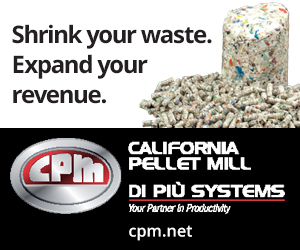
The $349 billion in initial funding for the Paycheck Protection Program ran out within two weeks. | NIKCOA/Shutterstock
Recycling companies across the country are applying to a federal assistance program to help them overcome cash-flow problems sparked by the coronavirus. Some have been successful, but others are running into banking complexities and tapped-out funding.
The Paycheck Protection Program (PPP) was launched this month by the federal Small Business Administration, as part of the Coronavirus Aid, Relief, and Economic Security (CARES) Act that was approved by Congress in March.
The program, which was initially stocked with $349 billion, offers businesses a loan designed to keep their workers on the payroll. The funds were depleted within days, but Congress recently passed – and President Trump signed – legislation funding the program with an additional $310 billion. The assistance program resumed taking applications this week.
One MRF operator that applied for a loan – but struck out on its first attempt – is Eco-Cycle, a nonprofit organization that runs the Boulder County Recycling Center in Colorado. Eco-Cycle’s experience highlights one element of the assistance program: Approval during the first round often came down to timing.
Eco-Cycle banks with a credit union, and that financial institution had to get approval to participate in the PPP program before accepting applications.
With the quickly changing rules coming down from the federal government, the process of getting ready to accept applications took longer than usual.
Once the credit union was approved and the Eco-Cycle application was completed, the organization submitted it but was informed that the PPP money was gone, said Suzanne Jones, executive director of the nonprofit organization. She indicated the group would continue to look into loan possibilities.
“We are poised, but we have yet to be successful,” she said.
Resource Recycling spoke with a variety of recycling companies that have applied for PPP loans over the past several weeks. They reported mixed results, describing how success has largely come down to timing and the connections applicants had at financial institutions.
‘The rules kept changing’
Under the terms of the PPP loan, businesses that keep their workers on the payroll for eight weeks after receiving the loan and use the money in accordance with SBA guidance on payroll, rent, mortgage interest or utilities will have the entire loan forgiven at the end of the eight-week period. Businesses work with their own bank to apply for the assistance.
The program began taking applications from small businesses, nonprofit groups and other entities with fewer than 500 employees on April 3. The $349 billion was quickly allocated to nearly 1.7 million applicants around the country and by April 16 the program closed to new applications.
But Senate lawmakers on April 21 passed the “Paycheck Protection Program and Health Care Enhancement Act,” providing additional funding for PPP and other coronavirus relief efforts. The House of Representatives passed it on April 23, and President Trump signed it on April 24.
“Being able to cover payroll for two months would be a huge benefit during a time of uncertainty.”
–Suzanne Jones, executive director of Eco-Cycle
Some recycling entities were able to secure loans in the first wave.
Gresham, Ore.-based Denton Plastics recycles both post-consumer and post-industrial scrap plastic. The company recently learned it was approved to receive a PPP loan after acting quickly to apply and staying on top of some complicated application details.
“It was pretty stressful just because the rules kept changing,” said Nicole Janssen, Denton’s president.
Janssen said a key part of the company’s success was having a strong relationship with her bank. Denton has used the same bank and worked with the same people there for years, making for a smoother process of working through the application challenges.
Denton hasn’t furloughed any employees and the loan will help the company continue operating at regular employment levels. Janssen said financial assistance was important because the reclaimer’s business overall is down between 10% and 20% since the pandemic took hold.
In nearby Molalla, Ore., Northwest Polymers processes scrap plastics from manufacturers and other industrial sources.
Not long after applying for the PPP, company owner Mark Shuholm received an email from his bank saying there was no more money to lend. Due to overwhelming demand, high application volume and limited time, the bank was unable to process all applications before the funding hit its cap.
Shuholm described the PPP application process as a bit like a lottery.
“If you had the right relationship with the right bank that had their system in place to get the application processed and submitted, then you probably got funded,” he said.
Eco-Cycle hopes to get approved during this latest round of funding. Jones said financial assistance in covering eight weeks of payroll would be “hugely helpful.” As a nonprofit organization, payroll makes up a good deal of the company’s costs each month.
“Being able to cover payroll for two months would be a huge benefit during a time of uncertainty,” Jones said. The organization has suspended some of its operations, including a center dedicated to processing hard-to-recycle materials, due to difficulty ensuring social distancing. In addition, its commercial collection business has slowed significantly.
Shuholm also hopes to receive assistance, but for now he noted that his company is still operating and that his employees are healthy.
“As with everything else in this current environment we are taking this in stride and will find a path to get through it,” he said. “I am impressed with the spirit of cooperation and teamwork of all of our customers and suppliers.”
At the same time, however, the experiences of small businesses during this episode are bringing harsh light to some in the banking sector. A recent Wall Street Journal article reported that application approval wasn’t necessarily based on a company’s chances of surviving the pandemic.
“Whether a firm made the cut often came down to how and where it banked,” the newspaper reported.
In another indication of the power banks wield in the PPP process, Wells Fargo faces a lawsuit alleging the company unfairly prioritized businesses seeking larger loans, instead of processing them on a first-come, first-served basis. Bank of America, JPMorgan Chase and Bancorp have also been sued.
Helping where it counts
In Vermont, an electronics recycling company that was approved for a PPP loan says the money will be a serious help for continuing operations.
American Retroworks, which operates a recycling plant in Middlebury, Vt., was among the first in its county to get his application into his local bank, said owner Robin Ingenthron. The business was approved for a $224,000 loan, based on eight weeks of average payroll costs from last year.
Before the payroll program, Ingenthron was doing some pretty bleak contingency planning. The possibilities were similar to what the company planned for in 2014 when it lost a large contract and in 2008 during the financial crisis, he said.
“There was definitely one scenario where we would go Chapter 11 and use the remaining money we had to outsource whatever was left and leave the plant clean,” he said. “We had that and worse scenarios, and this provides us a better one.”
Ingenthron said it’s important for companies to think not only of their own operations but of the companies they work with. He has worked with downstream customers as well as the landlord of one of his facilities to help them apply for the program. It’s important to shore up the businesses that a company relies on, Ingenthron said.
“If you had the right relationship with the right bank that had their system in place to get the application processed and submitted, then you probably got funded.”
–Mark Shuholm, owner of Northwest Polymers
Electronics recycling firm e-End of Frederick, Md. was approved for a six-figure loan through the program, a substantial boost for the company. In March, e-End closed its processing facility to keep employees and clients safe. The company plans to reopen once safety threats from the pandemic pass.
Without the PPP funds, e-End would have had to dip heavily into its cash reserves to keep paying employees, company President Steve Chafitz said.
“Obviously it’s something we didn’t want to do because there was no income to offset that,” he said.
With the funding, e-End is able to keep paying its 20 employees even as the facility is not operating, as well as pay rent and utilities.
The Maryland recycling firm’s story highlights another facet of the PPP process: In some cases, it was a completely smooth experience. The company submitted documents on April 4 and was approved for the loan two days later.
“The way the program was designed worked perfectly for us,” Chafitz said, noting that his good relationship with his bank, as well as the thoroughness of information submitted with the application, helped speed up the approval.
The company received its PPP funds on April 13.
Colin Staub, Dan Leif and Jared Paben contributed to this report.
A version of this story appeared in Plastics Recycling Update on April 22.
More stories about legislation
- State law, local ordinance and the question of alignment
- EPR stalls out in NY Assembly again
- Oregon bill could expedite a MRF’s troubled permit process



